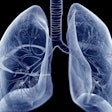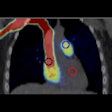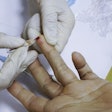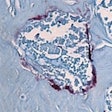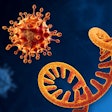Levels of a key type of immune cell are higher in head and neck cancer patients whose tumors are linked to the human papillomavirus (HPV), according to researchers at the University of Michigan Comprehensive Cancer Center. Results of their study were presented April 29 at the American Head and Neck Society annual meeting in Las Vegas.
Their findings suggest a way to predict which tumors are most likely to respond to chemotherapy and radiation, and allow doctors to choose the best treatment option upfront.
"In the past, we would give toxic chemotherapy to a patient, look at how the tumor responded and then decide whether the patient needed surgery or radiation," said study author Gregory T. Wolf, M.D., a professor and chair emeritus of otolaryngology at the University of Michigan Medical School, in a news release. "Now with patients who have HPV-positive cancers, this study suggests we can look in the microscope, measure the level of these immune cells and, based on that, select a treatment that is going to be potentially less toxic for the patient and most effective at curing the cancer."
He and his colleagues looked at 66 patients with oropharyngeal cancer. They measured levels of several immune system cells in the blood and tracked HPV status.
The HPV-positive patients had higher levels of a subset of T-lymphocyte cells, which are responsible for killing tumor cells. Patients who responded to an initial round of chemotherapy also had higher levels of these cells, while patients whose cancer recurred had lower levels.
"When we looked at how successful chemotherapy and radiation were, the levels of those killer T-lymphocyte cells predicted who was going to do well. That ability to predict response was even better than when we looked at whether the tumors were HPV-positive or negative," Dr. Wolf said.
The researchers suggest that these new findings could help them devise strategies to boost the immune system of HPV-negative patients and improve the success rate of current therapies.
Copyright © 2010 DrBicuspid.com







